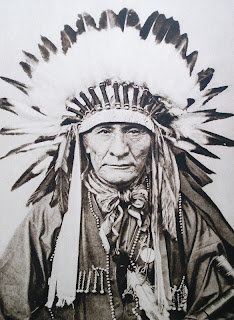 |
| A few weeks after their arrival in Berlin, Gripenberg received this photo of Gorky together with the beautiful Maria |
In the end of 1905 and the beginning of 1906 the Russian author
Maxim Gorky was in hiding in
Finland, invited by some Finnish activists, who fought the repressive czardom of which Finland then was a part. However, before long Gorky expressed a wish to leave Finland in order to see the world outside of
Russia.
In March 1906 the Finland-Swedish poet, baron
Bertel Gripenberg, who was on his way to
Germany anyway, was asked to escort Gorky and his beautiful mistress
Maria Andrejeva to
Berlin.
In his memoirs, published in 1943, Gripenberg gives a lively account of the journey which was supposed to take place in the highest secrecy (although it later became known that Russian officials knew about the trip, and as a matter of fact were happy to see Gorky leave):
"We had a so to say lucullic journey (on board a steamer from Turku to Stockholm) with an abundance of food and drink. When we arrived in Stockholm, my protégés behaved like a pair of unleashed children.
Quite amazed they admired the beautiful city, and then they began to rush from one shop to another bying everything they saw. I was in charge of their travel budget, and knew that they as a matter of fact had a lot of money to spend. In a couple of hours they had bought all kinds of things for about 800 crowns, quite a large sum at the time. Most of it was spent on jewellry, ladies´garments and gold and silver emroidery. When I tried to slow them down a little bit, Gorky only replied: ´Da eto krasivo!´ (but it is beautiful!). Consequently, it should be bought.
In order to put an end to this shopping spree, I took the good couple to lunch at hotel Continental across the street from the main railway station.
By then our presence had already caught the for us less than pleasant attention and curiosity of a wider audience. Maxim Gorky´s accordion boots, visible under his long fur coat, and his characteristic face, which in spite of his assurances could not be hidden by the raised fur collar, created a lot of attention.
Young boys began to follow us out of curiosity, and as soon as we had sat down at a well hidden table at the Continental, newspaper reporters began to surround us. Gorky, however, refused to give an interview, but the reporters were stubborn and during the entire lunch I had enormous trouble keeping them at distance. The situation was rapidly becoming unpleasant.
Rumours about the famous guests had spread in the then not so large city. From all the tables in the Contintental dining room people eagerly and with great interest observed everything we did.
I began contemplating what what to do, knowing that the train to Malmö only departed in the evening, and I did not want to lock ourselves in a hotel room for the rest of the day.
But suddenly a good idea came to me. I got hold of a car and asked the driver to take us to Skansen (Stockholm´s famous open air museum and zoo). The place was empty and peaceful, because on a grayish winter morning there are not many visitors in Skansen. We had been fortunate in getting away from the reporters and were now not bothered by anybody. The good Maxim rejoiced, happy as a child when he saw the bears. It was almost impossible to get him away from these wonderful animals, which he fed with lots of white bread. We stayed in Skansen for most of the day and only at dusk did we return to the city.
Wise from what had happened in the morning, I now requested a private room in the Rich restaurant, where the great proletarians offered the finest champagne dinner the restaurant was able to deliver - and that was not little. Not entirely sober we then finally made it to the continental train and had a good night´s sleep.
But on board the ferry from Malmö (to Copenhagen) all the fun began again. Gorky was exhilarated and delighted, he ordered all the best the rather well provided kitchen could offer. It was not the food of an ascetic, it was lobster, foie gras and lots of champagne. - "Now we shall celebrate my liberation from the chains of the czardom", Maxim said, proposed a toast, drunk it and hugged me. His eyes were shining and he was wonderful in his childish happiness. You could have thought that he was only seventeen. But this was the first time he was outside of Russia. At his age, that must have been quite a strong sensation."
PS
It should perhaps be added that although baron Gripenberg - who was to become one of the hardest anti-communists - did like Gorky as a person, he did not sympathize with Gorky´s later co-operation with Stalin. Gripenberg also was convinced that Gorky had written his most important works already before they met in 1905.













